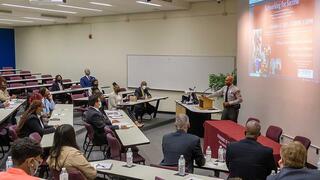
myEOL

myEOL

myEOL

myEOL

myEOL

NCCU.edu

NCCU.edu

myEOL

myEOL
This documentary highlights the strong tradition of faculty-student research collaboration within the NCCU Department of Criminal Justice, demonstrating how mentorship and rigorous training in research methodology prepare students to contribute to scholarship and tackle pressing issues in the field.
Dedicated to the memory of the late Professor Kenneth Campbell, this documentary honors his legacy and commitment to students by showcasing the impactful value of a faculty-student research project at an HBCU.
North Carolina Central University Assistant Professor Dr. Julian Muhammad leads a summer research team, including graduate and undergraduate students, to study and establish best practices for implementing disaster telemedicine to help communities respond effectively to increasing calamities.
As severe weather events increasingly strain medical services, this video describes disaster telemedicine—the use of technology and mobile medical units during disasters to provide triage and medical assessment—highlighting its potential to efficiently assist survivors in hard-to-reach or overwhelmed areas, especially rural communities.
These agencies coordinate preparedness, response, recovery, and mitigation efforts during disasters. Federal entities like FEMA provide national leadership and support, while state and local agencies manage on-the-ground operations tailored to community needs.
This department coordinates statewide preparedness, response, recovery, and mitigation efforts to protect lives and property during emergencies and disasters in North Carolina.
This office regulates, accredits, and supports EMS systems, training programs, and emergency medical providers across North Carolina.
This group provides 911 communications, fire prevention, and coordinated emergency response and management services to protect Durham County residents.
This area coordinates Raleigh’s preparedness, response, and recovery activities for emergencies, disasters, and major incidents.
This group manages countywide emergency planning, disaster response, hazard mitigation, and public safety coordination for Wake County.
This federal agency leads the nation’s efforts to prepare for, respond to, recover from, and reduce the impacts of disasters.
This provides links to emergency management doctrine and frameworks — such as the National Response Framework (NRF) and National Incident Management System (NIMS) — that establish a unified approach for managing emergencies across all government levels and sectors.
This goal defines the core capabilities needed to achieve a secure and resilient nation across the five preparedness mission areas.
This framework guides how the nation prevents credible threats of terrorism by identifying and stopping attacks before they occur.
This framework outlines how to safeguard people, infrastructure, and key resources against hazards and threats.
This framework provides the guiding principles and structures for how the nation responds to all types of disasters and emergencies.
This framework describes how the nation reduces risks and consequences of future disasters through sustained mitigation actions.
This system provides a standardized approach for managing incidents and coordinating responders across all jurisdictions and sectors.
A variety of programs, courses, and certifications are available through organizations like the Rural Domestic Preparedness Consortium, Texas A&M Engineering Extension Service (TEEX), DHS Center for Domestic Preparedness, and the Center for Homeland Defense and Security (CHDS). These resources and other resources like them enhance the skills and knowledge of emergency professionals and volunteers to effectively manage homeland security challenges and major disasters.
This consortium provides specialized training to rural first responders and emergency personnel to improve preparedness for emerging threats and disasters.
This group offers comprehensive emergency response, homeland security, and disaster management training for professionals nationwide.
This center delivers advanced, all-hazards training for emergency responders.
This center provides education, research, and training programs that strengthen national homeland security leadership and policy development.